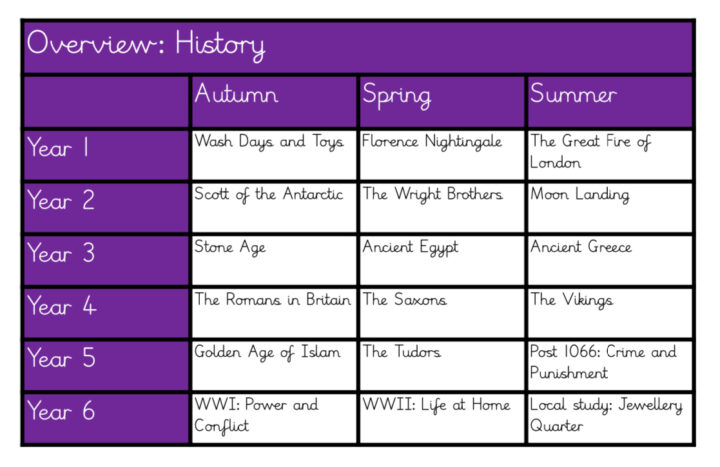History
The history curriculum at Slade provides a solid foundation and broad overview in some of the most important periods, events and themes in history. It is comprehensive but necessarily selective. The curriculum gives students a strong grounding in British and World history and begins chronologically in KS2 from the first settlements in the Stone Age, the ancient Egyptians and the ancient Greeks.
In Year 4, pupils study Roman Britain, Vikings and Anglo-Saxons. In Year 5, pupils study the Golden Age of Islam, before stopping off in the medieval period to learn about the Tudors, and, crime and punishment from 1066 onwards.
The curriculum follows time all the way up to World War II in Year 6 where pupils consider the themes of conflict and cause.
In KS1, pupils mainly study significant people and their achievements, and, changes through time such as toys and their appearance, and significant events. We do also touch on chronology in Year 2 in preparation for Year 3.
While studying these periods, the units explore themes of change and continuity, perspective and power. We have carefully selected the units exploring world history to provide global coverage and introduce a number of themes such as significance, power and conflict. We chose to include units such as the Golden Age of Islam to give our children an in-depth knowledge and pride in their heritage.
Throughout the curriculum pupils are taught the substantiate content which defines each period. This knowledge is planned and regularly revisited through the use of knowledge organisers, retrieval activities and explicit vocabulary teaching. We elaborate on more abstract concepts, such as toxic masculinity and the role in young boys illegally volunteering for WWI. All of our teachers have access to high quality texts and pictures to extract the best possible learning from our pupils.
Carefully developed across the key stages, pupil’s gain an increasingly sophisticated understanding of empire through analysing reasons for expansion and maintenance. However it is not only knowledge that is taught, the disciplinary skills of history – such as source skills, chronology, interpretation and continuity and change – are all explicitly taught and practised.
At the beginning of each unit, pupils use a high quality timeline to place newly learned periods of history – relative to previously studied periods – in time.
In light of the social factors that affect our pupils, we have decided to delve deeper into black history. Instead of celebrating black history across one week or month, pupils will learn about black history throughout the year, and this is intertwined with their history curriculum.
Finally, we are very proud of our local area. Year 6 undertake a humanities local study each year to Birmingham’s famous Jewellery Quarter. We collaborate with the university, local retailers and the Smith & Pepper factory to analyse how our locality and its uniqueness has changed.

